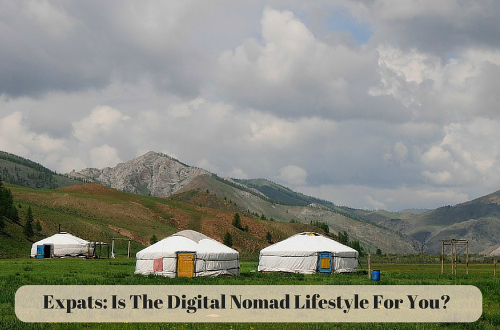The world has long had expatriates, and nomads too have always existed. However, of late there’s a new kind of on-the-move professional that we’re hearing more and more about – the digital nomad. For anyone who doesn’t yet know what that phrase means, it’s someone who has regular work, but is not tied to one location; someone who moves from place to place while using the internet to earn a living.Of course, digital nomads don’t necessarily have to be expats – it’s perfectly possible to move from place to place within a single country. However, if you’re not tied down to a location by a job and other responsibilities, why wouldn’t you widen your options to include locations in foreign countries as well as your own? More and more young people in particular are seeing the appeal of this life, and are choosing to move abroad and pursue this dream.
However, as with the expat life and any other lifestyle that’s outside the norm, not everyone is cut out for the life of a digital nomad. Personal circumstances, life goals, personality type, and plenty of other factors need to be considered. In addition, this life has its disadvantages and downsides, and for some people these may not be worth the advantages. Becoming a digital nomad can be expensive (especially at the start), challenging, and disruptive, and the rewards can be slow to come. It’s important to fully consider all the implications before making the leap. Here’s a look at what the digital nomad lifestyle offers and a few questions you should ask yourself in order to find out whether it is the one you really want in the long run.
The advantages of the digital nomad life
The most obvious attraction of the digital nomad lifestyle is the ability to travel and live in new places on a regular basis, without having to save up, schedule, and plan a vacation once a year. For many people, the frequent change of environment is in itself inspirational and beneficial to their work; for others, the rewards are more personal, but no less important.
Being a digital nomad also differs from being on vacation or on a sabbatical, where you typically have no income and your career takes a backseat. As a digital nomad, you continue to work and earn money, and ideally even progress in your career. The luckiest ones are probably those who have a regular job that allows them to be location-independent; however, many freelancers and contract workers today are also able to live successfully as digital nomads, and they often find work opportunities that they wouldn’t have found if they remained tied to a single location.
For some digital nomads, differences in currency values and costs of living also work in their favor. For example, for someone earning in US dollars while living in rural Vietnam, their income can go much further than it ever would back home. Depending upon your priorities, in such a situation, you could either spend a bit more on a better quality of life or reduce your working hours so that you have more time for leisure.
Do you have the right set of skills and experience?
The most crucial skill for a digital nomad is of course digital literacy. Using computers and the internet should be as easy for you as walking down the road. However, in addition, you need to identify a saleable skill that will allow you to work remotely. If you don’t already have such a skill, you’ll need to spend some time working on one. You could even offer a service that is relatively unskilled, such as data entry; however, remember that such jobs, which can be done by almost anyone with a computer, are unlikely to pay as much jobs requiring unique and hard-to-find skills. Experience is also important – employers and clients are unlikely to put their faith in a rookie who wants to work remotely, but if you have enough experience under your belt, it’s easier to pull off such deals.
People with skills like writing, web design, and photography have the biggest advantage here, but professionals in all kinds of fields manage to successfully live and work as digital nomads. There are even doctors who work in “virtual telemedicine”, seeing patients in Canada over Skype while based out of Bali. Often, a digital nomad will work in what is essentially an advisory role in an area where they have expertise. Others work as managers, remotely running teams for their employers or clients.
Identify the skills you can use, market them, and get work going for at least a few months before you actually take the leap. That way, at least the work part of your life will be running relatively smoothly while you try to find your feet in other areas.
If you’re lucky, you could even negotiate a remote work agreement with your current employer or search specifically for a new job that allows you to work from anywhere.
Do you have the personality to sustain this lifestyle?
Living successfully as a digital nomad requires a lot of habits that, at least to some extent, come down to personality. Networking and marketing yourself is important as a digital nomad, as it is for almost any freelancer. Don’t expect work to roll in on the basis of recommendations and word-of-mouth until much later. Initially you’ll need to do a lot of legwork, and not everyone has the personality to do this successfully.
Discipline is also important. Remember that this isn’t a long vacation, and if you treat it as such, your dream will soon crash miserably. While increased flexibility, freedom, and time for fun and leisure are important reasons why people want to live as digital nomads, it’s also important to have some sort of schedule and to meet deadlines. If you’re unable to regulate your life without rules being imposed on you by someone else, the digital nomad life may not be a good choice.

The digital nomad life can also mean working in isolation, which for some people, can lead to loneliness and monotony. Other aspects such as minimizing physical belongings may also not appeal to everyone.
Do you have the initial funds to sustain yourself?
Finances can be tight for the first year, especially if you’re working as a freelancer. Work can be hard to find, clients can take time to process payments, and it can be a while before a steady stream of money starts rolling in. In addition, relocation itself can be expensive, with visa charges, health insurance, rental deposits, and plenty of other costs piling up in the first month or two. It’s important to have enough savings to see you through these initial expenses and to act as a fallback during the first year. After all, you don’t want to end up in a situation where you are stuck abroad or need to return home because client payments are held up and you’ve run out of money. In general too, figure out how much your lifestyle will cost you and how much you need to earn to sustain it. Include things like international charges on credit cards and ATM withdrawals – these come as a nasty surprise to too many people.
Which locations are viable for you?
Even if your employer allows you to work from anywhere in the world, being a digital nomad doesn’t necessarily make that a practical option. Some locations will always be more viable than others. To some extent, this is a matter of cost, but there are also factors such as infrastructure (especially electricity and telecommunications networks), culture, distance from home, and various personal preferences that come into play.
Many Asian and South American countries provide two of the more important and universal requirements – a low cost of living and reliable modern infrastructure – which is why they attract a lot of digital nomads. In addition, places like Ubud in Bali provide a diverse community of digital nomads who support and promote each other, leading to a constant stream of people joining the community for varying periods of time. If you plan to be in each location for only a short time, you might need to focus on places with a good couchsurfing or Airbnb network, so that you don’t waste time or money on hotels.
Can you do without the support of family and friends back home (and can they do without yours)?
One of the biggest and most lasting difficulties you’ll face as a digital nomad is living without the support of your family and friends back home. This is of course something that all expats grapple with; however, most expats stay put in one location for a long enough period of time to put down roots and make friends. Long-term expats often form support networks that are as intimate and strong as those they had back home. However, as a digital nomad, you’re unlikely to stay in any one place for an extended period of time. This makes it almost impossible to make lasting friendships and form any meaningful real-life support networks. Most of your relationships are essentially conducted and maintained digitally, just like your work.
In the meanwhile, you’re missing birthdays, weddings, and other milestones and celebrations with your loved ones back home. There’s also the reverse to consider – you being unable to be with them in the flesh when they’re going through a tough time. Video calls and phone chat are useful, but they aren’t always a good substitute, and flying back home every time you’re needed is often not an option.
Remember that it’s also difficult to have a pet when you’re living a nomadic life. Some people do manage it, but this depends on both the owner and the pet itself. The frequent disruptions and readjustments may be upsetting and unfair to some pets. A pet may also hamper your ability to work at places like coffee shops and co-working spaces for more than a couple of hours. Travelling, especially between countries, can also be an issue – the experience can be traumatic and even dangerous for some animals, and some countries have long quarantine periods and other restrictions on bringing in pets.
How long do you hope to do this for?
A lot of the other considerations that we’re discussing here are contingent upon how long you plan to live as a digital nomad. Almost any issue can be easily managed if all you’re thinking about is a six-month period, which is little more than an extended vacation, with a little bit of work involved in order to meet expenses. Longer durations, on the other hand, need to be considered and planned more carefully, since everything gets a little more complicated. Think about whether you really want to and are able to live like this for several years, and also about how you will handle a situation in which you find that you need or want to return home and get back into a more “normal” lifestyle. One great situation that many digital nomads are able to manage is spending part of the year as a nomad and the other part at home. This takes some maneuvering, but if you can pull it off, it will allow you to retain the stability and other benefits of a home base while also reaping the benefits of the digital nomad life.
Have you lived the digital nomad lifestyle? What advice would you give to others who are thinking about it? Let us know in the comments!

